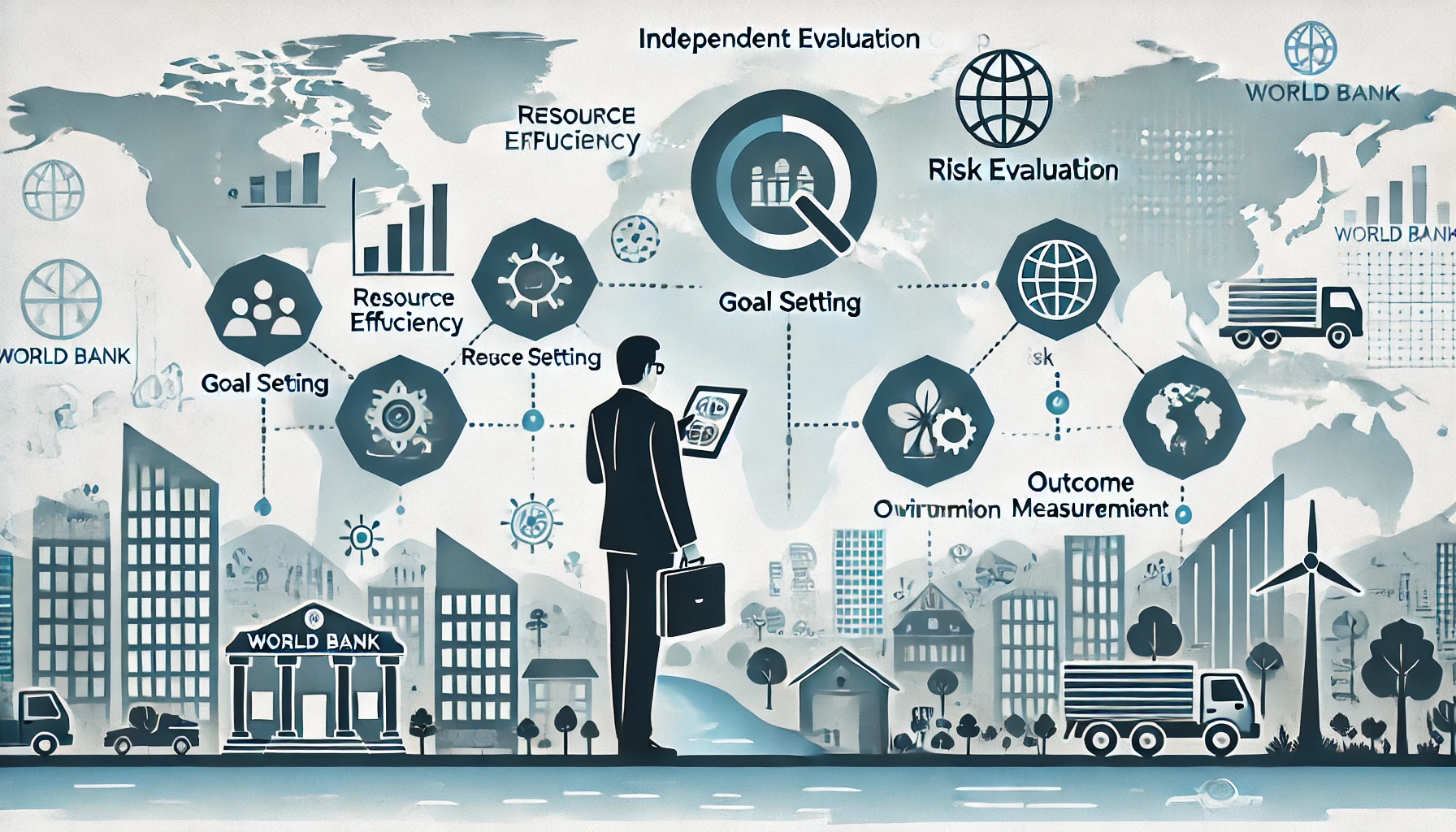Independent Validation for Sustainable Development: A World Bank Evaluation Guide
The "Guidance Manual for Independent Evaluation Group Validators" provides a structured approach for assessing World Bank project outcomes, emphasizing accountability, learning, and transparency. It guides independent validators through evaluating project relevance, efficacy, efficiency, and sustainability, ensuring projects meet development goals and inform future initiatives.

The "Guidance Manual for Independent Evaluation Group Validators" by the Independent Evaluation Group (IEG) is an essential resource developed to ensure a consistent and comprehensive approach to validating World Bank Implementation Completion and Results Reports (ICRs) for Investment Project Financing (IPF). Created by the IEG, a specialized unit of the World Bank responsible for independent evaluation, the manual serves as a guideline for validating the World Bank’s self-evaluation documents at the end of funded projects. ICRs are prepared for every project that receives funding from institutions like the International Development Association (IDA) or the International Bank for Reconstruction and Development (IBRD). These reports are intended to document projects' overall performance, outcomes, and impacts, capturing critical lessons and assessing the sustainability and broader influence of interventions. The validation process, the Implementation Completion and Results Report Review (ICRR) provides an independent, desk-based assessment of the evidence and results presented in the ICRs, along with their ratings. Unlike the project’s ICR, the ICRR relies solely on the project documentation and does not involve further data collection. This independent review validates the accuracy of the World Bank’s self-assessment, offering an unbiased appraisal of outcomes that is then shared across various stakeholders, including World Bank staff, government agencies, and the public.
Evaluating Objectives and Project Efficacy
The ICRR focuses on multiple aspects of a project’s life cycle to assess its success, with specific attention to the project's relevance, efficacy, efficiency, and risk to sustaining development outcomes. Each ICRR review begins with a review of the project’s objectives as stated in the original lending agreement, ensuring that the goals are concrete and relevant within the project’s context. The IEG then reviews the evidence presented for the project’s achievements, looking at how effectively it delivered on its intended objectives. The IEG also carefully considers the project’s efficiency by evaluating how resources were used, examining both the direct costs and the extent to which the project achieved its benefits efficiently. Efficiency measures may include net present value or economic rate of return calculations when applicable, and IEG validators assess the project's operational and administrative efficiency to gauge value for money. The final evaluation also includes a risk assessment, which considers both internal and external factors that could influence the sustainability of project outcomes, such as technical risks, financial stability, political circumstances, and environmental or social factors.
Ensuring Accountability Through Bank Performance Review
Bank performance is another critical focus of the validation process, examining the quality of support provided by the World Bank from the project’s inception through implementation and supervision. This includes an analysis of the Bank’s performance in identifying and mitigating potential risks during project design and its capacity to manage supervision activities effectively. The assessment of the Bank’s role emphasizes accountability and reflects the extent to which the World Bank fulfilled its responsibilities, supported client institutions, and made necessary adjustments when challenges arose. Another key area is monitoring and evaluation (M&E), which is crucial for assessing the project's progress and outcomes accurately. The manual underscores the importance of a well-designed M&E system, specifying that it should be adapted to project demands and provide reliable, timely data for effective decision-making. The M&E system should align with the project's theory of change and results framework, ensuring that indicators are measurable, context-appropriate, and reflect the project's intended outcomes.
Special Considerations for Fragile and Conflict-Affected Areas
For projects implemented in fragile, conflict, and violence (FCV) contexts, the manual offers additional guidance tailored to the unique challenges posed by these environments. Projects in FCV situations often face rapidly changing circumstances, political instability, and limited institutional capacity, making it difficult to assess long-term impact accurately. The guidance suggests that objectives be realistic and attuned to FCV conditions, with an M&E framework that incorporates flexibility and adaptability. It also emphasizes the importance of designing projects that can respond effectively to evolving risks in these regions. When reviewing ICRs for projects in these settings, validators are encouraged to consider the broader impact of interventions, including their potential to improve institutional resilience or contribute to stability and governance improvements within the affected regions.
Documenting Insights from Canceled Operations
The manual also addresses how to handle “Notes on Canceled Operations” for projects that fail to reach significant levels of implementation. In such cases, a special report known as an NCO is produced, detailing the reasons for the project’s cancellation and any relevant lessons that may be drawn from the experience. This information is shared to provide insight and learning, even when projects do not fully materialize as planned. IEG validators assess NCOs by reviewing whether the cancellation reasons were documented and examining the actions taken by the World Bank to address the issues leading to cancellation. This section provides the foundation for accountability, allowing the World Bank to learn from past project cancellations and improve its approach to planning and risk management.
Strengthening Future Interventions Through Comprehensive Validation
Ultimately, the IEG’s validation process is integral to the World Bank’s accountability and learning framework, ensuring that completed projects are assessed accurately and transparently. Through the structured evaluation of ICRs, the IEG upholds the credibility of the World Bank’s self-evaluation process, contributing to enhanced development impact and better-informed decision-making. By detailing the expectations and procedures for ICR validation, the guidance manual supports the IEG’s mission to improve the effectiveness of development initiatives, providing a reliable system of checks and balances within the World Bank’s project evaluation architecture. Through these validated reviews, the World Bank can demonstrate accountability to stakeholders and apply critical insights to strengthen future development interventions.
- FIRST PUBLISHED IN:
- Devdiscourse










